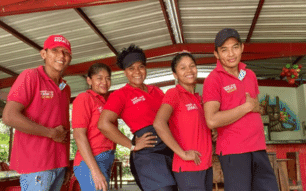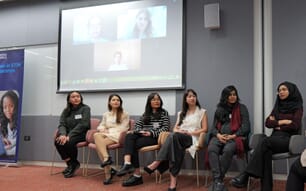What inspired you to set up the Aquagettes?
The inspiration came from a feeling of frustration and the fact that we all had experienced some level of inequality, either directly or indirectly through others, whilst working in aquaculture. The majority of us are currently post-doctoral researchers and there is a striking lack of women in permanent and management positions in the aquaculture academic domain. This is a pattern that can also be seen in other sectors of the aquaculture industry in the UK. When people experience a level of gender inequality as an individual they are unlikely to act upon it, but when people share collective experiences a sense of enablement can lead to positive action and change. We created the Aquagettes to provide this platform for women and men to reach out and share their experiences. The endorsement that this group is receiving is already increasing awareness of gender imbalance issues in the aquaculture industry which can empower us to make changes.
We would also like to express our enthusiasm for the theme of this series on The Fish Site and our encouraged that women and equality topics in aquaculture are getting more global attention.
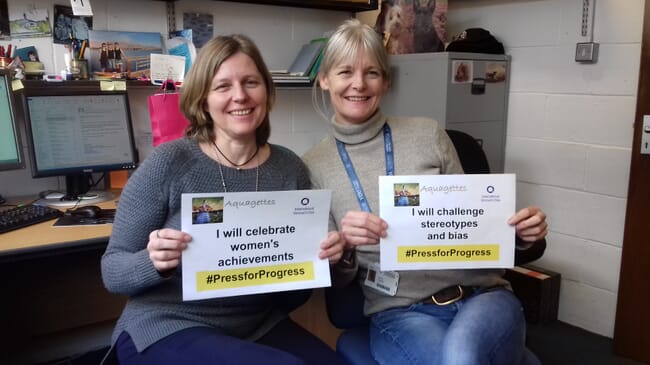
Can you give a brief summary of the experience of your founding members?
The founders of the Aquagettes are Drs Rowena Hoare, Sophie Fridman, Sonia Rey Planellas and Marie Smedley. We collectively have over 50 years of experience in aquaculture research, covering a diverse range of topics such as fish health, behaviour and welfare, fish immunology, parasitology and reproductive physiology, and we have all worked on key species such as salmonids and tilapia.
We all met at the University of Stirling’s Institute of Aquaculture, the leading international centre for aquaculture research and teaching, and the majority of us still work there as post-doctoral research fellows, with the exception of Dr Marie Smedley who now works for Xelect Ltd, a company that provides genetic support to the global aquaculture industry.
We share a strong level of passion, perseverance and dedication to our work, but also wish to maintain a great family life alongside it. Three of us have children and it would be true to say that, for women, this tends to put a dent in career opportunities. Things are improving for women in this regard these days with initiatives like Athena Swan, committed to advancing the careers of women in STEM employment in higher education and research. Also, the Daphne Jackson Trust, which was pivotal in the return of Dr Hoare to aquaculture research following time taken out to raise twins.
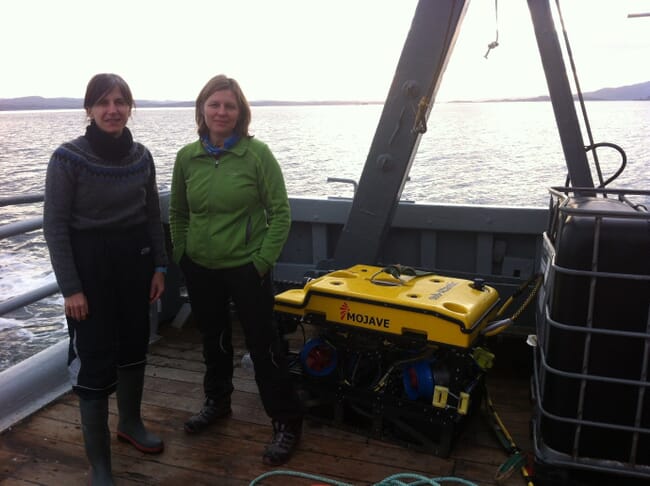
What outstanding challenges would the Aquagettes most like to solve?
What we want to do is to highlight gender inequality issues as well as discuss inspirational positives within the aquaculture industry and academia. We hope this will provide an empowering tool to ensure women, their projects and organisations are supported. It goes without saying that women are as essential as men to the sustainable development of the aquaculture sector and our ultimate goal is to move everyone towards the same page.
Aquagettes is simply a platform, not affiliated to any institution or company, that acts as a network for women working within the aquaculture sector at any level – whether it is academia, technical roles, management positions, within government or directly involved in the farming industry. This platform can be used to share experiences, console and seek advice, and ultimately empower women and men on a variety of gender inequality issues. As a group we can inspire change more effectively than we could do as individuals.
What do you see as the greatest challenge in the recognition and advancement of women in the UK aquaculture sector?
We see one of the biggest and most complex challenges to both women and men is the issue of enabling women to continue working during pregnancy, to return to work having taken time out to raise children and to also provide opportunities for women to choose to return to work sooner. Time out for women can often feel compulsory rather than a choice – due to the expenses of childcare coupled with a persisting societal view that this is the female role. There are now great options for men to take shared parental leave but awareness and societal pressure have seemingly stunted uptake. We are keen to hear experiences from other women in aquaculture and we hope that they can use the Aquagettes to highlight ongoing issues and to provide positive examples that can inspire our fellow women and men in aquaculture. Some women can feel isolated and need to speak up in their workspace, particularly in environments that have historically been dominated by men.
What’s the level of participation been to date?
There seems to be a big appetite for our goals. The Facebook page has really taken off, with over 150 followers and a healthy participation in only a couple of months. We have just linked a Twitter account to enable a wider audience to follow our activities. At the moment we are meeting informally once a month at the Institute of Aquaculture. However, we hope to organise larger-scale meetings in the future, to allow women and men to join in the ongoing conversation, called “The Shoal”.
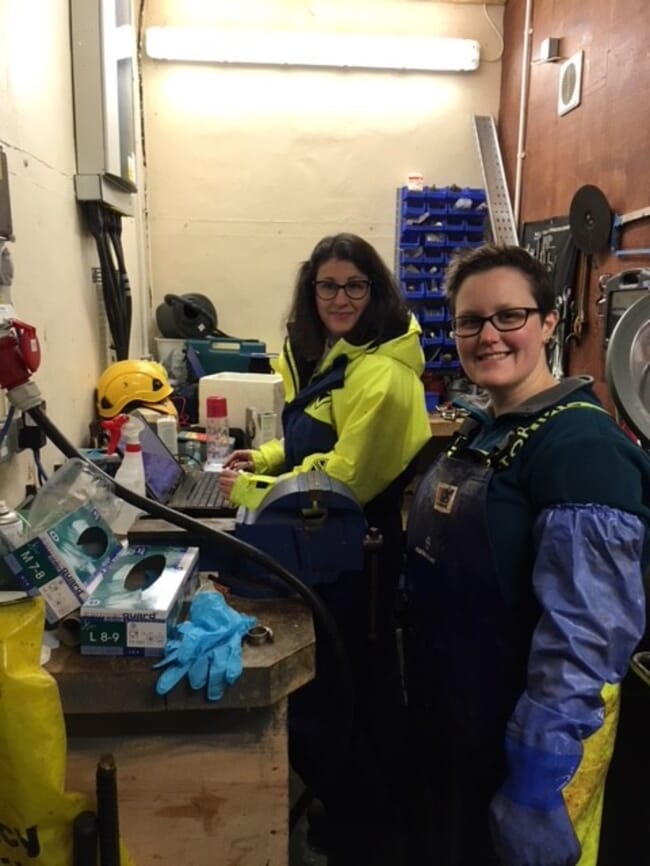
Our next goal is to set up a meeting and workshop inviting keynote speakers, both women and men, covering current topics on inequalities faced in aquaculture and how to address them and also to share their experiences.
How has the initiative been received by colleagues – both male and female?
We have had more interest than we initially anticipated and we have also had a good deal of support from male colleagues. As we all know, inequality isn’t just something that women experience. For instance, many men working in aquaculture find it difficult to take time off or even leave work on time to look after their children, often because of social pressures to stay in work. This isn’t the case for all workplaces and we hope that through the platform we can normalise male and female equality so that both men and women have a fair choice in their aquaculture career trajectory.
What inspired you to pursue a career in aquaculture?
It would seem that everyone has their own unique story that led to their career in aquaculture. It is a relatively new agricultural sector when compared to the more traditional crop or large-animal production sectors and is currently growing at a faster rate than livestock and poultry production. As a result, many women are attracted to an industry that is incredibly diverse with big growth potential, the same way anyone would be.
Are there any individuals or organisations in aquaculture who you’ve found particularly inspirational?
Professor Sandra Adams from the Institute of Aquaculture springs to mind as a trailblazing woman amongst a predominantly male shoal. She has supervised an impressive number of students over the years, from BSc to PhD level. In addition, she has championed the Institute of Aquaculture and the University of Stirling through innovative diagnostics and vaccine development and internationally through collaborations with scientists and industry in order to tackle the challenges that disease brings to aquaculture. She is also a wonderful mentor to all her post-doctoral researchers, encouraging and supporting them to develop their careers.
Another individual is Professor Felicity Huntingford, a wonderful fish behaviourist from Glasgow University. She is a pioneer of her time defending women’s rights as a fantastic researcher in a male-dominated environment, while being at the same time an excellent mother.
Have any of your members faced any particular gender-based challenges in aquaculture?
Equality in our job positions has been the main challenge. There is still a very small percentage of women in permanent academic positions or in management positions in the aquaculture sector.
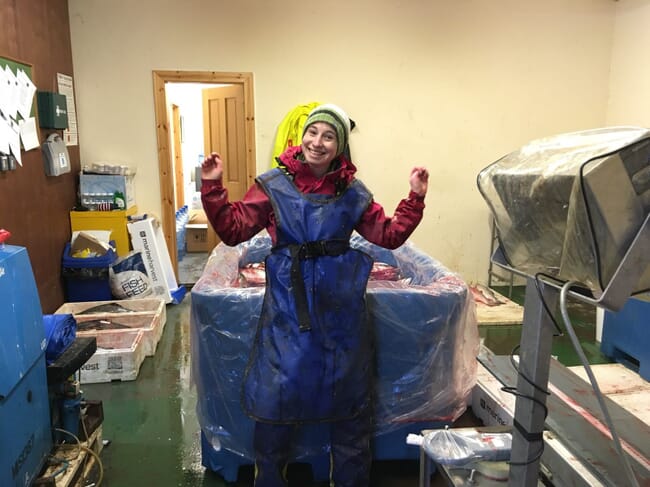
For some women, gender challenges can be felt as a constant underlying current depending on the makeup of the work environment. For instance, women can sometimes feel intimidated in meetings that are male-dominated. In addition, constructive criticism from women can unfortunately be interpreted as aggressive behaviour, whereas it is not in men. Sadly, we have known a few occasions where women have been told openly in meetings they need to be quiet. The lone woman can feel “ganged up on” and left wondering whether the person would have behaved in the same manner if she were a man. This is not the case for all workspaces and we believe that awareness of equality and diversity topics will help to standardise appropriate attitudes towards women.
What advice would you give to women looking to start a career in the aquaculture sector?
Our advice would be to find your own niche in the aquaculture sector, as it is really an all-encompassing arena, and maintain enormous amounts of motivation and enthusiasm for what you do! The fact that aquaculture is such a rapidly growing and developing discipline is exciting and is ideal if you like challenges and want to make a difference. Also, if you are working in Scottish aquaculture, try not to shy away from working in what can be often adverse weather conditions and don’t be afraid to get wet!
What would be your dream role in aquaculture and do you think it’s realistic to achieve?
From the point of view of post-doctoral researchers, a permanent position in the academic field of aquaculture, as this is our background. However, many other women would aspire to management roles in industry or create their own businesses. Women are gaining a foothold in health roles in the Scottish salmon- and trout-farming industry, but will this lead to senior management roles in what is traditionally a male dominated industry? We certainly hope so.


